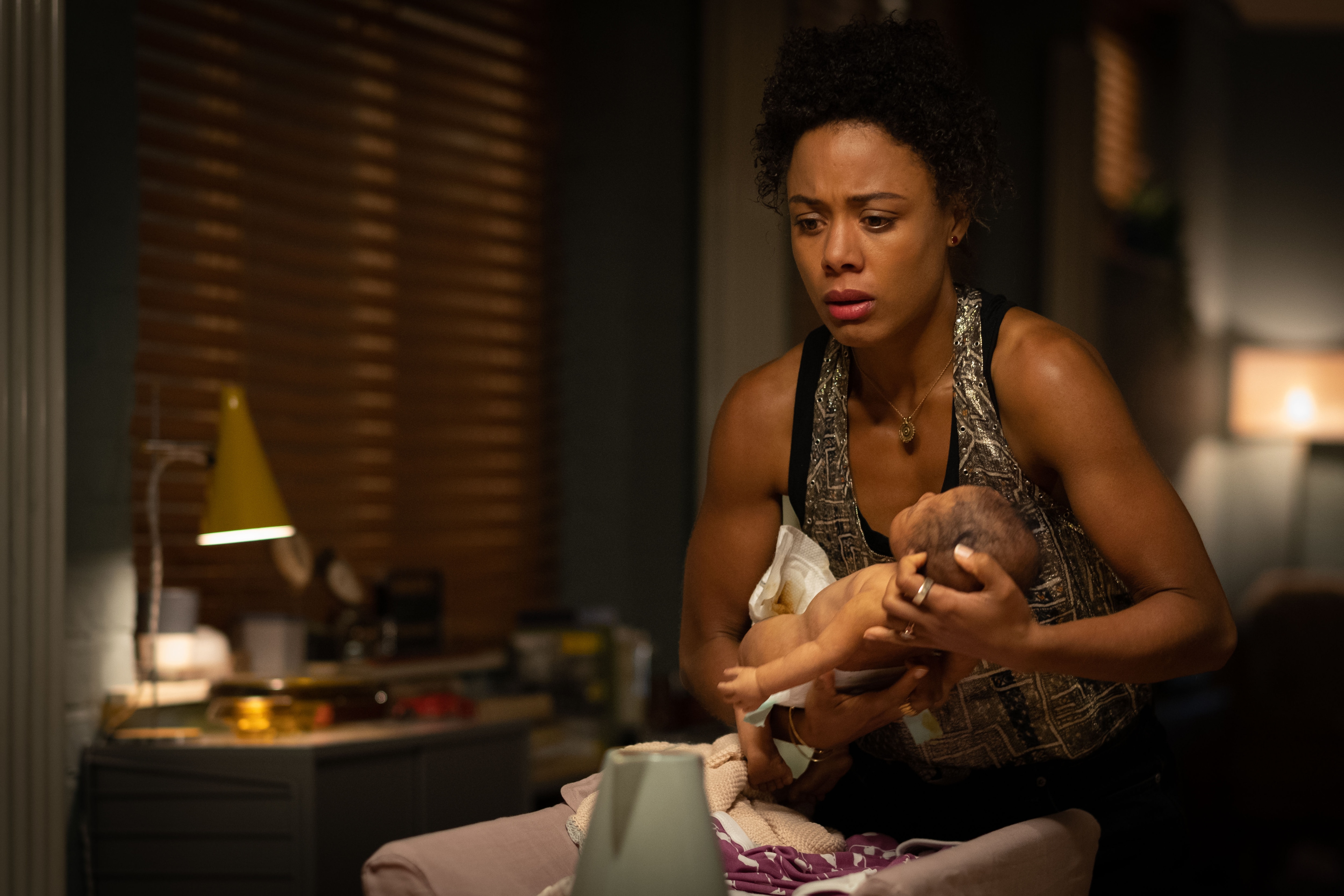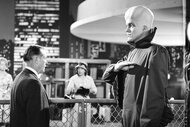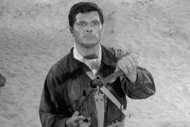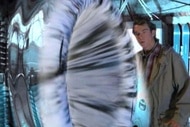Create a free profile to get unlimited access to exclusive videos, sweepstakes, and more!
The Feed showrunner Channing Powell created a tech dystopia on Amazon

Technology is scary. Social media dominates our world in a terrible way, consuming some and terrorizing others, while screen addicts pour their lives into digital points from strangers. The idea that we're headed toward a dystopia in which technology invades and destroys life as we know it isn't new, but it's certainly becoming easier to swallow.
Nobody knows that like Channing Powell, a writer and producer known for her extensive work on AMC's The Walking Dead. She's now the showrunner on a new show on Amazon called The Feed, which is all about what happens when people give their lives over to technology (more than we all have already). The dystopian techno-drama, which premiered on November 22, is about a brain-implanted version of the internet that allows the sharing not just of funny cat videos, bad movie memes, and political news, but emotions, memories, and thoughts.
Tom Hatfield (Guy Burnet) is a man resisting The Feed, a fight complicated by the fact that his parents happen to be the masterminds behind the whole thing. His dad Lawrence (David Thewlis) invented The Feed, while his mom Meredith (Michelle Fairley) is the CEO of its corporate owner. To make things even more complicated, Tom and Kate (Nina Toussaint White) are having a baby. It's a powder keg that's bound to explode, especially as people on The Feed begin showing murderous tendencies.
Speaking to SYFY WIRE, Powell explained the anxieties she wanted to include in The Feed, how it differs from its Nick Clark Windo novel source, and what current technologies inspired the dystopia.
Tell me how you got The Feed off the ground.
Toward the end of the year in 2016, my agency contacted me with a summary of the book and a sort of sizzle reel, saying that this production company in London wanted to produce this with an American writer. Would I be interested? I read the summary and it sounded really interesting, then I watched the sizzle reel, which looked amazing. I'd been on The Walking Dead for a little while, so I was looking for a chance to develop something, and this felt like a great transition. It was in a familiar world for me, but different enough that I could explore different stories and characters and a different apocalyptic setting.
I read that you were initially skeptical about the technology used to create The Feed and leads to the dystopia, but then learned that it was almost here.
I thought, "Oh, this couldn't happen, no one would let someone put something into their brains. You could never remove it. Why would you let someone be that invasive with you?" Then I looked it up and it's definitely happening already. Elon Musk is working on a brain mesh; there's a group at MIT who've created a little gadget that reads your thoughts already. This is in the works.
Then I polled some of my younger friends, who are a little more attached to technology. If you could put an iPhone in your head, would they ever do it? It was astounding to see the amount of yeses I got — enthusiastic yeses! If I didn't have to carry my iPhone and I could put it in my brain where I thought-controlled everything? Yes. Definitely.
How far into current trends in social media did you research?
I had to look into it just to keep abreast of what's happening, but I'm a mom of two young girls. Reading too much about it just terrifies me. I can't sleep at night, I'm worried about what'll happen to them, and what'll happen to us. Will The Terminator ... is that a prophecy? I can't delve too far into it because I think it's just too creepy. I hope as long as it stays a fun thing that people are using to connect each other, and it doesn't break out of boundaries that it shouldn't, then that's good. But I'm definitely anxious.
You mentioned your daughters. The Feed has some severe Rosemary's Baby vibes. How do you update those trust issues and anxieties for this high-tech show?
I found pregnancy very interesting. I didn't have the Instagram filter of "everything is beautiful and wonderful." I felt like, I'm literally growing another person. I'm a science experiment. That's so strange. I don't even know this person, but I'm supposed to love it for the rest of my life. Science is weird: You do end up loving this thing that you've produced more than anything in the world. But it does feel, at least for me, like a Rosemary's situation.
Everyone says it'll be great, it'll be wonderful. I was like, "Will it? I don't know that I subscribe to that philosophy." So on top of all those fears pregnant women have already, maybe not particular to mine — like "Will my baby be okay? Will it be safe? What kind of world am I bringing them into?" — if you add another layer ... we're already dealing with the issue of technology with our kids, them asking for phones earlier and wondering what they're watching on YouTube, to suddenly bring them into a world where technology is in their heads, and you can't escape it, and it can read every thought you're having? It can mess with your head.
You have all these general anxieties just being pregnant, but then on top of that, knowing you're bringing your child into a world where technology reigns supreme and she'll probably have to have this chip put in her brain, and do you want that for your child—what does that mean? Is there any natural childbirth anymore? When everything in your body, technology-wise, is telling you it's okay, but something feels off and you don't know how to explain it.
There's definitely a theme of trusting your body and what that means in a world where your body is linked so closely with a tech system. Especially in a medical context for pregnant women, I feel like personal feelings aren't really respected. Sort of a "the technology knows your body better" thing.
Right, right. Exactly. I did want to inject this feeling that you're not in control of yourself anymore. Is it you or is it the machine making that decision? Is it you or the machine having that thought? Where do I end and where does the machine begin? I really wanted that feeling of losing self-control and not being able to do anything about it because you've allowed this system to invade your body. You kinda did it to yourself.
With a few characters you see them struggling with some internal issues. And, if there is a problem — when it's so pervasive and it's everywhere — is there a way to get away from it?
You don't have the ability to consent to it when you're born into this world. The idea of consent comes up very frequently in The Feed.
Especially with Tom, who's born into this family. He definitely didn't have a choice at all. It was forced upon him, and now it's forced upon his family as well. He's tried to carve out this special nook for himself, but his father's world keeps dragging him back in.
I love the business side of the family. It's very much horrifying dystopia ... and also Succession.
Yeah! That came about before Succession came out, not that I came up with huge family-run companies like this that're dealing with their own kind of struggles and internal battles, but when I saw Succession I thought, "Oh man, that's amazing, they're really doing it right, and please God I hope we're even a fraction of that."
When you're making this company and this family, did you look to real Silicon Valley?
In the book, there are flashes of flashbacks—not actual flashbacks. They're sort of opaque. You only get a little bit about Tom's backstory. I tried to take the information from those, but I did have to invent the characters of Lawrence and Meredith from nothing. I'm almost positive they're not even given names in the book. There was a brother dynamic in the book that I tried to take from as well, so just knowing I had two brothers and a powerhouse father ... where can I go from that? If I want Tom to be this kind of person, the rebel in his family, then there's the brother who lives for his father and only wants to please him.
Then I listened to a few podcasts with tech giants. They all have this strange demeanor about them. Telling you lies wrapped up in pretty language. I don't want to say all of them are like that, but that was what I thought was interesting. People basically saying to somebody, "Hey, here's a pill that could kill you or help you. We don't know, but take it."
It's the newest pill we have.
Exactly. The newest, prettiest, shiniest pill we have, that we're pretty sure is saving the world, but might be killing you all. So that was really the idea behind Lawrence. And then I didn't want a stay-at-home wife. I wanted somebody as strong as Lawrence, who could be as important to the company as Lawrence is. A vital partner for Lawrence, not just someone he comes home to. So that led to the strong CEO in the form of Meredith.
You really do get a vibe of some Mark Zuckerberg things that've been in the news.
Again, all this stuff was happening while we were breaking the show, which was fascinating. We weren't mimicking real life when it happened; what we were writing started happening in real life.
What happens when real life gets crazier than your fiction?
Even though I know people are working on this technology and it feels closer than ever, I still have some block in my mind where I think, "Well, this can't really happen, so how do I make this feel as grounded as possible?" When it happens in real life, it's almost validating. Oh, okay, we're not crazy. Maybe this won't seem like a ridiculous premise. Now that the majority of people are seeing this happen, it'll actually make it scarier when they watch the show.
You touched on the structure of the book. The first season is really just the first chapter and the flashbacks.
It was just the first chapter of the book that The Feed was up, and the whole rest of the book it's down and you're dealing with the aftermath of that. You got glimpses of how it worked in the flashbacks, but I thought—in terms of adapting it for television and getting people attached to these characters and the lives they were leading—it was important for you to be impacted by the loss of The Feed. I wanted to show how it was working first so that you could be heartbroken by the outcome of it in the second season. That stark contrast is really interesting, because you can play with two totally different worlds in Season 1 and Season 2.
That's something you don't get in tech dystopia things. Usually they go the Black Mirror route where it does its twist and then ends. You get to avoid that.
I've been told it's like one episode of Black Mirror stretched into a season, which is a big compliment for me. You live with these characters for much longer and see how it affects their relationships and families. You see—with somebody like Danny, who is so reliant on The Feed—how the hell would he ever live life off it? That sets up a good cliffhanger: This is the life they're used to, so what happens after that?
Then you get to flex your Walking Dead muscles.
It's a little bit more of seeing the world before The Walking Dead and after The Walking Dead. In The Walking Dead, we're straight into The Walking Dead world and don't go back into the lives of the characters that often. We naturally know that life, that's the life we're living today. The life of The Feed is much different than our current reality.
The aesthetic you use for the actual Feed is really interesting, with a sort of bubble-ish UI. How did your team come up with that?
The technology was always the most daunting part of the show for me. I was nervous about how it would look, especially because this might be a reality soon. We don't want to be so out of touch that we look ridiculous and we also don't want it to look terrible five years from now. We took a more simplistic approach and tried to enhance what we've already seen.
Text bubbles: how can we make that something that appears in your eye and doesn't obscure the world around you, yet still feels fresh and different. Our designers came up with this plan to make them a little like a kaleidoscope, but invisible. So when you're looking at it, you actually see the background of the city street or whatever melting into the bubble. That way they blend as seamlessly as they can with your reality.
Simple and elegant was the mantra.
You worked with director Carl Tibbetts, who did Black Mirror's "White Bear" and "White Christmas,” on your first two episodes. What did he bring to the table for you?
He's actually more technologically savvy than I am. He was the only one that came in and brought to life what I was thinking about in my head. That was the only time I thought "This guy gets it." He came in with a big presentation about how he saw what it all looked like. I had it in my mind and tried to write it out as best as I could, but he actually gave it visuals. He helped elevate the project in a way that I was hoping could be done. There was a lot of fear going into it—I don't want to be in a Peep Show POV, so how do we make that as elegant as we can? He really pulled through on that end for us.


























